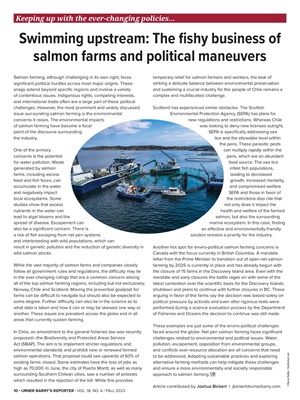
10 • URNER BARRY'S REPORTER / VOL. 18, NO. 4 / FALL 2023
Salmon farming, although challenging in its own right, faces
significant political hurdles across most major origins. These
snags extend beyond specific regions and involve a variety
of contentious issues. Indigenous rights, competing interests,
and international trade often are a large part of these political
challenges. However, the most prominent and widely discussed
issue surrounding salmon farming is the environmental
concerns it raises. The environmental impacts
of salmon farming have become a focal
point of the discourse surrounding
the industry.
One of the primary
concerns is the potential
for water pollution. Waste
generated by salmon
farms, including excess
feed and fish feces, can
accumulate in the water
and negatively impact
local ecosystems. Some
studies show that excess
nutrients in the water can
lead to algal blooms and the
spread of disease. Escapement can
also be a significant concern. There is
a risk of fish escaping from net pen systems
and interbreeding with wild populations, which can
result in genetic pollution and the reduction of genetic diversity in
wild salmon stocks.
While the vast majority of salmon farms and companies closely
follow all government rules and regulations, the difficulty may lie
in the ever-changing rulings that are a common concern among
all of the top salmon farming regions, including but not exclusively,
Norway, Chile and Scotland. Moving the proverbial goalpost for
farms can be difficult to navigate but should also be expected to
some degree. Further difficulty can also lie in the science as to
what data is taken and how it can or may be skewed one way or
another. These issues are prevalent across the globe and in all
areas that currently sustain farming.
In Chile, an amendment to the general fisheries law was recently
proposed-the Biodiversity and Protected Areas Service
Act (SBAP). The aim is to implement stricter regulations and
environmental standards and prohibit new or renewed farmed
salmon operations. That proposal could see upwards of 60% of
existing farms closed. Some estimates have the loss of jobs as
high as 70,000. In June, the city of Puerto Montt, as well as many
surrounding Southern Chilean cities, saw a number of protests
which resulted in the rejection of the bill. While this provides
temporary relief for salmon farmers and workers, the task of
striking a delicate balance between environmental preservation
and sustaining a crucial industry for the people of Chile remains a
complex and multifaceted challenge.
Scotland has experienced similar obstacles. The Scottish
Environmental Protection Agency (SEPA) has plans for
new regulations and restrictions. Whereas Chile
was looking to deny new licenses outright,
SEPA is specifically addressing sea
lice and the allowable level within
the pens. These parasitic pests
can multiply rapidly within the
pens, which are an abundant
food source. The sea lice
infest fish populations,
leading to decreased
growth, increased mortality,
and compromised welfare.
SEPA and those in favor of
the restrictions also cite that
not only does it impact the
health and welfare of the farmed
salmon, but also the surrounding
marine ecosystem. In this case, finding
an effective and environmentally friendly
solution remains a priority for the industry.
Another hot spot for enviro-political salmon farming concerns is
Canada with the focus currently in British Columbia. A mandate
letter from the Prime Minister to transition out of open-net salmon
farming by 2025 is currently in place and has already begun with
the closure of 15 farms in the Discovery Island area. Even with the
mandate and early closures the battle rages on with some of the
latest contention over the scientific basis for the Discovery Islands
shutdown and plans to continue with further closures in BC. Those
arguing in favor of the farms say the decision was based solely on
political pressure by activists and even after rigorous tests were
performed during a science evaluation process by the Department
of Fisheries and Oceans the decision to continue was still made.
These examples are just some of the enviro-political challenges
faced around the globe. Net pen salmon farming faces significant
challenges related to environmental and political issues. Water
pollution, escapement, opposition from environmental groups,
and conflicts over resource allocation are all concerns that need
to be addressed. Adopting sustainable practices and exploring
alternative farming methods can help mitigate these challenges
and ensure a more environmentally and socially responsible
approach to salmon farming.
Article contributed by Joshua Bickert | jbickert@urnerbarry.com
Swimming upstream: The fishy business of
salmon farms and political maneuvers
Keeping up with the ever-changing policies…
©Marius Dobilas / Shutterstock.com